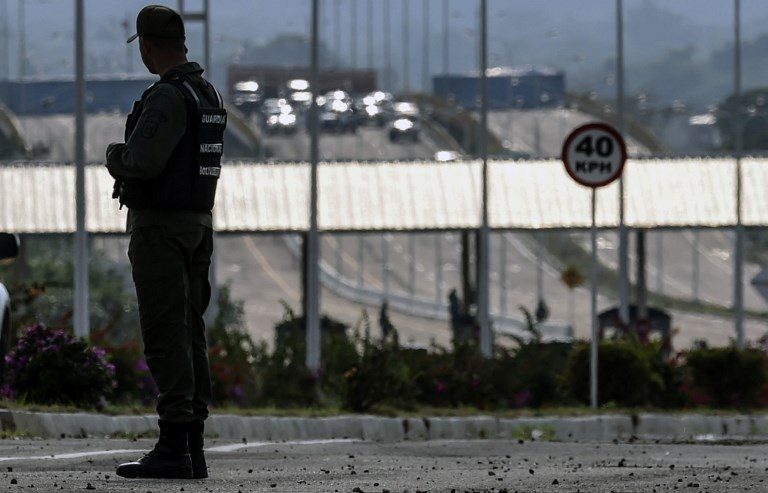SUMMARY
This is AI generated summarization, which may have errors. For context, always refer to the full article.

CARACAS, Venezuela – Venezuela’s opposition announced Monday, February 11, a new collection center for desperately-needed supplies as it prepares to “send a message” to the military that’s blocking humanitarian aid from entering the crisis-wracked country with a mass street protest.
Opposition chief Juan Guaido, now recognized by 50 countries as Venezuela’s interim president, will lead a rally on Tuesday as he steps up pressure on beleaguered President Nicolas Maduro and tries to force the military to back down and allow in the aid.
Venezuela is in the midst of a disastrous economic crisis marked by hyperinflation, recession and shortages of basic necessities such as food and medicines. The UN says some 2.3 million people have fled the country since 2015.
Guaido says 300,000 people risk death if the supplies donated by the United States and others, stockpiled at Venezuela’s border with Colombia, are not brought in soon.
“We’re mobilizing all over the country to ensure the humanitarian aid enters so we can deal with this crisis,” said Guaido.
He said that blocking the aid would constitute a “crime against humanity,” but top military leaders still stand with leftist leader Maduro.
Guaido says almost 100,000 Venezuelans have signed up as volunteers to help bring in the aid and distribute it to those most in need.
Second storage center
Maduro refuses to buckle, though, branding the aid convoys massing in Colombia a “political show” and a pretext for a US intervention.
Humanitarian aid has become a key factor in the power struggle between Guaido, who last month proclaimed himself acting president, and Maduro.
National Assembly president Guaido’s envoys met with Brazilian officials in Brasilia and announced plans to establish a second aid storage center in the state of Roraima, on Venezuela’s southeastern border.
Guaido’s ambassador to Brazil, Maria Teresa Belandria, said she had received assurances from Brazilian Foreign Minister Ernesto Araujo over the new aid center.
Lester Toledo, head of Guaido’s aid distribution team, told reporters that the Roraima center would start receiving supplies next week.
But Defense Minister Vladimir Padrino announced that the armed forces were deploying a “reinforced presence all along the border.”
On Sunday, dozens of doctors protested on the Venezuelan side of the border demanding the aid, which started arriving at the Colombian town of Cucuta on Thursday, be allowed into the country.
But the military has blockaded the border bridge linking the two countries.
“This a crime against humanity, men of the armed forces,” Guaido said Sunday, February 10.
He has offered amnesty for any members of the armed forces who disavow Maduro, in a bid to break the president’s backbone of power.
The parliament speaker wants to oust Maduro and set up a transitional government ahead of new elections. To do so, he needs the support of the armed forces.
Guaido will press the Organization of American States to provide support to hold new presidential elections, his representative to the body Gustavo Tarre said ahead of Friday’s special meeting at the OAS on the situation in Venezuela.
“The observation of the OAS is a guarantee, it has a great weight for the moral prestige of the organization and it has the technical capacity to help us set up a transparent process,” Tarre told reporters after meeting in Washington with Francisco Guerrero, who leads the OAS Secretariat for Strengthening Democracy.
However, he stressed that in order to be impartial, holding elections will take time.
“We want everything to go as quickly as possible, but holding elections in a month is impossible. We do not currently have any electoral mechanism that works because everything has been tarnished by fraud. In Venezuela, voters vote but do not choose, and we will change that.”
Speaking to AFP last week, Guaido refused to rule out eliciting foreign intervention.
The Venezuelan military meanwhile announced it had started conducting exercises, set to run until Friday, to “reinforce the country’s defensive capacity.”
Financial probe into Guaido
Venezuela’s financial accountability authority announced a probe into Guaido’s income, saying he had “allegedly… received money from international and national bodies without any justification.”
Two weeks ago, the regime loyalist-dominated Supreme Court barred him from leaving the country and froze his assets.
Tuesday’s march, in part to remember the estimated 40 people killed in clashes between protesters and the security services since January 21, aims to increase the pressure on Maduro to step aside.
Guaido warned that the military would be held responsible for the deaths of protesters.
The US is using sanctions as an attempt to starve Maduro’s regime of its funding.
More than 40% of Venezuela’s oil, which makes up 96% of its revenue, is sold to the US.
Pope Francis has said he would be prepared to mediate between the rival leaders but Guaido has rejected negotiations with Maduro, believing he would use them to buy time.
While keen on papal mediation, Maduro was less impressed last week when a group of European and Latin American ministers called for new presidential elections. Maduro accused them of bias.
Last week, he also rejected a call by European Union countries to hold elections, prompting them to recognize Guaido. – Rappler.com
Add a comment
How does this make you feel?
There are no comments yet. Add your comment to start the conversation.